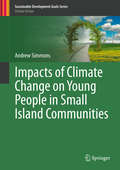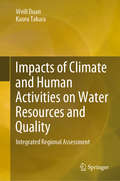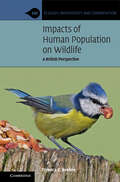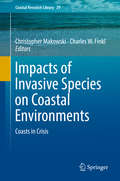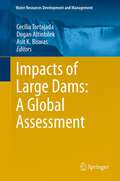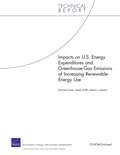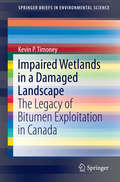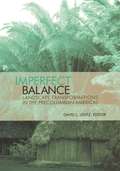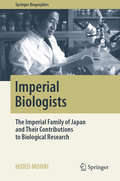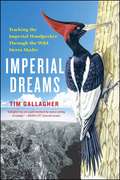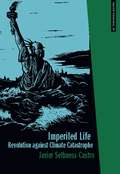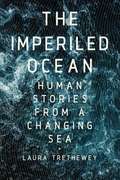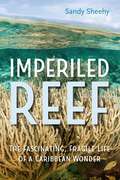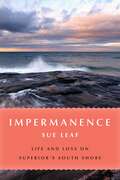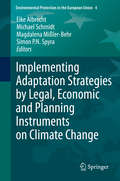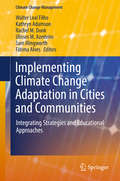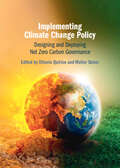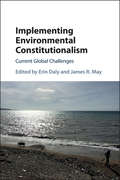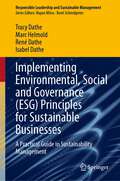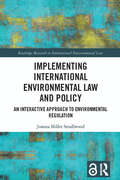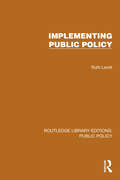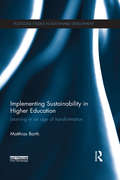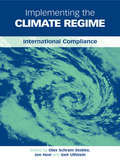- Table View
- List View
Impacts of Climate Change on Young People in Small Island Communities (Sustainable Development Goals Series)
by Andrew SimmonsThis book presents a comprehensive overview of the history, definition, causes, effects, impacts and implications of climate change on young people globally, with a focus on Small Island Communities (SIDS) in particular. The text highlights the key problems associated with the impact of climate change on young people in SIDS, specifically its effects on socio-economic development and livelihoods, and explores the need for the development of a new conceptual framework to deal with building the resilience of the adaptive capacity of youth in SIDS. The book analyzes the strengths and weaknesses of the emerging phenomenon of Global Youth Climate Change Movements/Actions, and examines the management/governance challenges associated with the Movement in terms of its operational mechanism, mobilization strategies and its use of social media/technology to mobilize mass action. The text concludes with a recommendation for further research in this area as a way to understand how the Movement functions and its mechanism for implementation of future research.
Impacts of Climate and Human Activities on Water Resources and Quality: Integrated Regional Assessment (Springer Geography Ser.)
by Weili Duan Kaoru TakaraWith the rapid increase of world population, the global water shortage is set to be the major crises of the twenty-first century; that is, population dynamics (growth, age distribution, urbanization and migration) create pressures on freshwater resources due to the increased water demands and pollution. Moreover, water resources management faces a new uncertainty- i.e. the potential for longer-term and more persistent climate change nowadays, which, in coming years, may significantly affect the availability of supply and patterns of water demand. This book mainly focuses on the impact of climate change and human activities on water quality and water resources in Asia Countries. It begins by describing the characteristics of water related disasters in the world. Then, the book analyzes the changes of floods and associated socio-economic damages for whole China over the last century, and assesses water quality and pollution source for the Yangtze River Basin, suggesting water-related disasters would become more intense, longer lasting, and/or more frequent in a future warmer climate. Then, after investigating spatiotemporal trends and causes of water quality and water quality incidents (Chapter 4) and precipitation extreme events (Chapter 5) in Japan, subsequent two chapters mainly evaluate the climate and human impacts on precipitation variations, water quality and water resources in the Hokkaido area. The final chapter comprehensively analyzes climate change impacts on water resources in the Aral Sea Basin, and then estimate the water requirements and water deficits for irrigation, future agricultural yields of seven major crops, and land and water productivity in four provinces of Turkmenistan considering climate change, population growth, and three socio-economic development scenarios. All results obtained from this book may provide a means to reduce water quality incidents and mitigate future negative impacts by adapting water management. Furthermore, the improved methods for water quality modeling in data scarce regions are transferable to other study areas and applicable in future research.
Impacts of Human Population on Wildlife: A British Perspective (Ecology, Biodiversity and Conservation)
by Trevor J. BeebeeWildlife and the countryside are highly valued by people in the UK, and for good reason. Healthy habitats are invaluable assets and promote human wellbeing. However, they are under increasing threat from, among other things, relentless urban expansion and intensive modern agriculture. These pressures largely stem from a major underlying cause – the high and growing population of humans living in the UK. This book provides an overview of wildlife in the UK and its recent status; factors contributing to wildlife declines; trends in human numbers; international deliberations about the impacts of human population growth; and the implications for the future of wildlife conservation in the UK. The evidence-based text includes comparisons of wildlife declines and their causes in other countries, providing a global perspective. This book is for ecologists, naturalists and conservation biologists studying and working in academia or in consultancies, as well as all those interested in wildlife conservation.
Impacts of Invasive Species on Coastal Environments: Coasts in Crisis (Coastal Research Library #29)
by Charles W. Finkl Christopher MakowskiThis book focuses on the global threats to coastal environments from invasive, non-native species and examines how these alien biological species adversely alter landscapes and socioeconomic conditions as well as the psychological attitudes and perceptions of local inhabitants and tourists. Designed for the professional or specialist in marine science, coastal zone management, biology, and related disciplines, this volume appeals to those not only working directly with invasive flora and fauna species, but also those individuals involved in a wide array of coastal related fields. Examples and case studies of coastal invasive species are drawn from many different geographic areas worldwide, including North and South America, Europe, Oceania, the Caribbean, Southeast Asia, and Africa.
Impacts of Large Dams: A Global Assessment
by Asit K. Biswas Cecilia Tortajada Dogan AltinbilekOne of the most controversial issues of the water sector in recent years has been the impacts of large dams. Proponents have claimed that such structures are essential to meet the increasing water demands of the world and that their overall societal benefits far outweight the costs. In contrast, the opponents claim that social and environmental costs of large dams far exceed their benefits, and that the era of construction of large dams is over. A major reason as to why there is no consensus on the overall benefits of large dams is because objective, authoritative and comprehensive evaluations of their impacts, especially ten or more years after their construction, are conspicuous by their absence. This book debates impartially, comprehensively and objectively, the positive and negative impacts of large dams based on facts, figures and authoritative analyses. These in-depth case studies are expected to promote a healthy and balanced debate on the needs, impacts and relevance of large dams, with case studies from Africa, Asia, Australia, Europe and Latin America.
Impacts on U.S. Energy Expenditures and Greenhouse-Gas Emissions of Increasing Renewable-Energy Use
by Robert J. Lempert Michael Toman James GriffinHow could producing 25 percent of U.S. electricity and motor-vehicle transportation fuels from renewables by the year 2025 affect U.S. consumer energy expenditures and CO2 emissions? This report finds that reaching 25 percent renewables with limited impact on expenditures requires significant progress in renewable-energy technologies and biomass production. Without substantial innovation in these areas, expenditures could increase considerably.
Impaired Wetlands in a Damaged Landscape
by Kevin P. TimoneyThis work is a scientific monograph that examines the flora and vegetation of natural mineral wetlands in comparison to mineral wetlands affected by bitumen exploitation. The work is of broad relevance because (a) wetland loss and degradation is a global problem; (b) the continued global increase in fossil fuel exploitation is resulting in widespread damage; and (c) bitumen (tar sands, oil sands) exploitation is a rapidly growing and destructive set of activities. The core of the work is a meta-analysis of 417 vegetation plots. Analyses of change over time and chemical and physical attributes of water and soil are presented for the subset of plots with sufficient data. The purpose of the work is to demonstrate that: (1) There are marked differences between natural and industrially-affected wetlands. (2) Industrially-affected mineral wetlands differ from natural wetlands in their vegetation assemblages, their depressed vegetation and species diversity, and their abundance of exotic weeds. (3) Successful post-bitumen mining wetland reclamation has not been accomplished and may not be attainable within the foreseeable future given the ecological and physical conditions of the industrial wetlands, current reclamation practices, and lax regulatory standards. In regard to government policy and industrial practices, it finds that they are responsible for reclamation failure on a grand scale.
Imperfect Balance: Landscape Transformations in the Pre-Columbian Americas
by David L. LentzWe often envision the New World before the arrival of the Europeans as a land of pristine natural beauty and undisturbed environments. However, David Lentz offers an alternative view by detailing the impact of native cultures on these ecosystems prior to their contact with Europeans. Drawing on a wide range of experts from the fields of paleoclimatology, historical ecology, paleontology, botany, geology, conservation science, and resource management, this book unlocks the secret of how the Western Hemisphere's indigenous inhabitants influenced and transformed their natural environment. A rare combination of collaborators uncovers the changes that took place in North America, Mexico, Central America, the Andes, and Amazonia. Each section of the book has been comprehensively arranged so that a botanical description of the natural vegetation of the region is coupled with a set of case studies outlining local human influences. From modifications of vegetation, to changes in soil, wildlife, microclimate, hydrology, and the land surface itself, this collection addresses one of the great issues of our time: the human modification of the earth.
Imperfect Balance: Landscape Transformations in the Pre-Columbian Americas (Historical Ecology Series)
by Ed. David L. LentzWe often envision the New World before the arrival of the Europeans as a land of pristine natural beauty and undisturbed environments. However, David Lentz offers an alternative view by detailing the impact of native cultures on these ecosystems prior to their contact with Europeans. Drawing on a wide range of experts from the fields of paleoclimatology, historical ecology, paleontology, botany, geology, conservation science, and resource management, this book unlocks the secret of how the Western Hemisphere's indigenous inhabitants influenced and transformed their natural environment.A rare combination of collaborators uncovers the changes that took place in North America, Mexico, Central America, the Andes, and Amazonia. Each section of the book has been comprehensively arranged so that a botanical description of the natural vegetation of the region is coupled with a set of case studies outlining local human influences. From modifications of vegetation, to changes in soil, wildlife, microclimate, hydrology, and the land surface itself, this collection addresses one of the great issues of our time: the human modification of the earth.
Imperial Ambitions: Conversations on the Post-9/11 World
by Noam Chomsky David Barsamian[From the book cover] Timely, illuminating, and urgently needed, this volume of interviews conducted by award-winning radio journalist David Barsamian features Noam Chomsky discussing U.S. policies in the increasingly unstable post-9/11 world. In these exchanges, appearing for the first time in print, Chomsky offers his frank, provocative, and informed views on the invasion and occupation of Iraq, the doctrine of preemptive strikes against so-called rogue states, and the growing threat to international peace posed by the U.S. drive for domination. In his inimitable style, Chomsky also dissects the propaganda system that fabricates a mythic past and airbrushes inconvenient facts out of history.
Imperial Biologists: The Imperial Family of Japan and Their Contributions to Biological Research (Springer Biographies)
by Hideo MohriThis book sheds light on a little-known aspect of the Imperial family of Japan: For three generations, members of the family have devoted themselves to biological research. Emperor Showa (Hirohito) was an expert on hydrozoans and slime molds. His son, Emperor Akihito, is an ichthyologist specializing in gobioid fishes, and his research is highly respected in the field. Prince Akishino, Emperor Akihito’s son, is known for his research on giant catfish and the domestication of fowl, while Prince Hitachi, Emperor Akihito’s brother, has conducted research on cancer in animals.The book shows how they became interested in biology, how seriously they were committed to their research, what their main scientific contributions are, and how their achievements are valued by experts at home and abroad.To commemorate the 60-year reign of Emperor Showa and his longtime devotion to biology, the International Prize for Biology was founded in 1985. The prize seeks to recognize and encourage researches in basic biology. A list of winners and a summary of their research are presented in the last part of the book.The author, an eminent biologist who has given lectures to the Imperial Family, explains their research and tells the fascinating story of biology and the Imperial Family of Japan. The book is a valuable resource, not only for biology students and researchers, but also for historians and anyone interested in science and the Royal and Imperial families.
Imperial Dreams: Tracking the Imperial Woodpecker Through the Wild Sierra Madre
by Tim GallagherA decade ago, Tim Gallagher was one of the rediscoverers of the legendary ivory-billed woodpecker, which most scientists believed had been extinct for more than half a century—now Gallagher once again hits the trail, journeying deep into Mexico&’s savagely beautiful Sierra Madre Occidental, home to rich wildlife, as well as to Mexican drug cartels, in a perilous quest to locate the most elusive bird in the world—the imperial woodpecker.The imperial woodpecker&’s trumpetlike calls and distinctive hammering on massive pines once echoed through the high forests. Two feet tall, with deep black plumage, a brilliant snow-white shield on its back, and a crimson crest, the imperial woodpecker had largely disappeared fifty years ago, though reports persist of the bird still flying through remote mountain stands. In an attempt to find and protect the imperial woodpecker in its last habitat, Gallagher is guided by a map of sightings of this natural treasure of the Sierra Madre, bestowed on him by a friend on his deathbed. Charged with continuing the quest of a line of distinguished naturalists, including the great Aldo Leopold, Gallagher treks through this mysterious, historically untamed and untamable territory. Here, where an ancient petroglyph of the imperial can still be found, Geronimo led Apaches in their last stand, William Randolph Hearst held a storied million-acre ranch, and Pancho Villa once roamed, today ruthless drug lords terrorize residents and steal and strip the land. Gallagher&’s passionate quest takes a harrowing turn as he encounters armed drug traffickers, burning houses, and fleeing villagers. His mission becomes a life-and-death drama that will keep armchair adventurers enthralled as he chases truth in the most dangerous of habitats.
Imperiled Life
by Javier SethnessImperiled Life theorizes an exit from the potentially terminal consequences of capital-induced climate change. It is a collection of reflections on the phenomenon of catastrophe--climatological, political, social--as well as on the possibilities of overcoming disaster. Javier Sethness-Castro presents the grim news from contemporary climatologists while providing a reconstructive vision inspired by anarchist intellectual traditions and promoting critical thought as a means of changing our historical trajectory. Javier Sethness-Castro is a libertarian socialist and a rights advocate. Imperiled Life is his first book.
Imperiled Ocean: Human Stories From A Changing Sea
by Laura TretheweyAn exploration of the earth's last wild frontier, filled with high-stakes stories that explores a vast territory undergoing tremendous change and the people and places facing an uncertain future. On a life raft in the Mediterranean, a teenager from Ghana wonders whether he will reach Europe alive, and if he does, whether he will be allowed to stay. In the North Atlantic, a young chef disappears from a cruise ship, leaving a mystery for his friends and family to solve. A water-squatting community battles eviction from a harbor in a Pacific Northwest town, raising the question of who owns the water. Imperiled Ocean by ocean journalist Laura Trethewey is a deeply reported work of narrative journalism that follows people as they head out to sea. What they discover holds inspiring and dire implications for the life of the ocean — and for all of us back on land. As Imperiled Ocean unfolds, battles are fought, fortunes made, lives lost, and the ocean approaches an uncertain future. Behind this human drama, the ocean is growing ever more unstable, threatening to upend life on land. As we explore with Tretheway, we meet biologist Erin Stoddard tracking sturgeon in the Pacific Northwest. Unable to stop the development and pollution destroying the fish’s habitat, Stoddard races to learn about the fish before it disappears. This prehistoric fish has survived more than 300 million years on earth and could hold important truths about how humanity might make itself amenable to a changing ocean. As a fisher and scientist, Erin’s ability to listen to the water becomes a parable for what faces the ocean today. By eavesdropping on an imperiled world, he shows a way we can move forward to save the oceans we all share—through listening and discovery.
Imperiled Reef: The Fascinating, Fragile Life of a Caribbean Wonder
by Sandy SheehyThe beauty and drama of a world beneath the surface of the waves This book brings alive the richly diverse world of an underwater paradise: the Mesoamerican Barrier Reef. Stretching 625 miles through the Caribbean Sea along the coasts of Mexico, Belize, Guatemala, and Honduras, this reef is the second largest coral structure on the planet. Imperiled Reef searches out the breathtaking intricacies of this endangered ecological treasure. Research shows that the future of the reef is at risk, Sheehy explains. Looking closely at threats ranging from global warming to overfishing to irresponsible development, Sheehy draws attention to the inspiring efforts of nongovernmental agencies, scientists, and local communities who are working together to address these challenges. She includes practical actions individuals can take to protect this reef—as well as marine ecosystems everywhere. Celebrating a vast, submerged landscape that has too often been undervalued, Imperiled Reef is both a strong case for protecting an international marvel and a powerful message of hope for the world’s oceans.
Impermanence: Life and Loss on Superior's South Shore
by Sue LeafA personal journey through the ever-changing natural and cultural history of Lake Superior&’s South Shore Lake Superior&’s South Shore is as malleable as it is enduring, its red sandstone cliffs, clay bluffs, and golden sand beaches reshaped by winds and water from season to season—and sometimes from one hour to the next. Generations of people have inhabited the South Shore, harvesting the forests and fish, mining copper, altering the land for pleasure and profit, for better or worse. In Impermanence, author Sue Leaf explores the natural and human histories that make the South Shore what it is, from the gritty port city of Superior, Wisconsin, to the shipping locks at Sault Ste. Marie, Michigan. For Leaf, what began as a bicycling adventure on the coast of Lake Superior in 1977 turned into a lifelong connection with the area, and her experience, not least as owner of a rustic cabin on a rapidly eroding lakeside cliff, imbues these essays with a passionate sense of place and an abiding curiosity about its past and precarious future. As waves slowly consume the shoreline where her family has spent countless summers, Leaf is forced to confront the complexity of loving a place that all too quickly is being reclaimed by the great lake. Impermanence is a journey through the South Shore&’s story, from the early days of the Anishinaabe and fur traders through the heyday of commercial fishing, lumber camps, and copper mining on the Keweenaw Peninsula to the awakening of the Northland to the perils and consequences of plundering its natural splendor. Noting the geological, ecological, and cultural features of each stop on her tour along the South Shore, Leaf writes about the restoration of the heavily touristed Apostle Islands National Lakeshore to its pristine conditions, even as Lake Superior maintains its allure for ice fishers, kayakers, and long-distance swimmers. She describes efforts to protect the endangered piping plover and to preserve the diverse sand dunes on the Michigan coast, and she observes the slough that supports rare intact wild rice beds central to Anishinaabe culture. Part memoir, part travelogue, part natural and cultural history, Leaf&’s love letter to Lake Superior&’s South Shore is an invitation to see this liminal world in all its seasons and guises, to appreciate its ageless, ever-changing wonders and intimate charms.
Implementing Adaptation Strategies by Legal, Economic and Planning Instruments on Climate Change
by Michael Schmidt Eike Albrecht Magdalena Mißler-Behr Simon P. N. SpyraThe causes and effects of climate change are just as varied as the proposed solutions and approaches for dealing with the problem. Given the global character of climate change, comprehensive global cooperation is called for that leads to effective and appropriate international action in accordance with the respective responsibilities. These will inevitably differ depending on the capabilities and the social and economic situations of the respective actors. The contributions in this book present a variety of ideas, approaches and tools regarding the adaptation to climate change in specific countries and regions. In addition to examining (existing) legal instruments, they also focus on the implementation of economic instruments and planning tools, as well as their (further) development. Rather than simply discussing strategies to counteract climate change by reducing emissions, the authors also search for ways of actively adapting to climate change.
Implementing Climate Change Adaptation in Cities and Communities
by Walter Leal Filho Ulisses M. Azeiteiro Fátima Alves Kathryn Adamson Rachel M. Dunk Sam IllingworthThis book analyzes how climate change adaptation can be implemented at the community, regional and national level. Featuring a variety of case studies, it illustrates strategies, initiatives and projects currently being implemented across the world. In addition to the challenges faced by communities, cities and regions seeking to cope with climate change phenomena like floods, droughts and other extreme events, the respective chapters cover topics such as the adaptive capacities of water management organizations, biodiversity conservation, and indigenous and climate change adaptation strategies. The book will appeal to a broad readership, from scholars to policymakers, interested in developing strategies for effectively addressing the impacts of climate change.
Implementing Climate Change Policy: Designing and Deploying Net Zero Carbon Governance
by Ottavio Quirico Walter BaberThe chapters in this volume provide an interdisciplinary and comparative analysis of the implementation of climate change policies worldwide to assess whether they are meeting the aims set out in the 'Paris Agreement'. The first part compares climate policies employed by the EU, the US, Latin America, Russia, China, the Middle East, and Africa. The second explores ways of improving key regulatory mechanisms to increase the effectiveness of greenhouse gas mitigation and adaptation measures. This book argues that the international community should improve the effectiveness of enforcement mechanisms from the standpoint of secondary norms through an integrated approach. It is an indispensable resource for undergraduate and graduate students of environmental policy and governance, public policy, law and political science, as well as policy makers. This title is part of the Flip it Open Programme and may also be available as Open Access. Check our website - Cambridge Core - for details. (150, 992)
Implementing Environmental Constitutionalism: Current Global Challenges
by Erin Daly James R. MayConstitutions can play a central role in responding to environmental challenges, such as pollution, biodiversity loss, lack of drinking water, and climate change. The vast majority of people on earth live under constitutional systems that protect the environment or recognize environmental rights. Such environmental constitutionalism, however, falls short without effective implementation by policymakers, advocates and jurists. Implementing Environmental Constitutionalism: Current Global Challenges explains and explores this 'implementation gap'. This collection is both broad and deep. While some of the essays analyze crosscutting themes, such as climate change and the need for rule of law that affect the implementation of environmental constitutionalism throughout the world, others delve deeply into geographically contextual experiences for lessons about how constitutional environmental law might be more effectively implemented. This volume informs global conversations about whether and how environmental constitutionalism can be made more effective to protect the natural environment.
Implementing Environmental, Social and Governance: A Practical Guide in Sustainability Management (Responsible Leadership and Sustainable Management)
by Marc Helmold Tracy Dathe René Dathe Isabel DatheThe concept of environmental, social and governance (ESG) is rapidly emerging as the new global industry standard and an important benchmarking tool for socially responsible investments. Major corporations seek the expertise of specialized consultants to develop and implement tailored ESG framework for their businesses. This book offers a guide to ESG and its practical applications. Beyond introducing the structured procedures of the most common ESG approaches, it delves into the comprehensive impact on the value chain, providing practical insights. The text explores the latest trends in various business sectors, offering insights into their ESG practices. Closing with a forward-looking perspective, the book anticipates future developments such as climate change management and ESG certifications, while also addressing potential pitfalls encapsulated by the term “greenwashing”.Written by authors with a solid background in teaching and research, the book establishes a robust theoretical foundation. The inclusion of numerous practical examples and country-specific recommendations enhances this book’s applicability and makes it an invaluable resource to those navigating the complexities of ESG.
Implementing International Environmental Law and Policy: An Interactive Approach to Environmental Regulation (Routledge Research in International Environmental Law)
by Joanna Miller SmallwoodThis book introduces a novel discourse, based on socio-legal theory of compliance with international environmental law, which addresses the overarching question: When can international environmental law and policy achieve implementation, compliance, and be effective?Offering an important contribution to academic and practical understandings of implementation and compliance with international environmental obligations, the book firstly critiques existing multidisciplinary theories of law and then brings together international and domestic legal theories to highlight their symbiotic relationship. It also stresses the importance of interactions between domestic and international legal and policy processes. This pioneering discourse is argued to be transformative to international environmental regimes and offers a way for them to be truly normative and to achieve compliance.The book will be of interest to students and scholars in the field of socio-legal studies and international environmental law and policy.The Open Access version of this book, available at http://www.taylorfrancis.com, has been made available under a Creative Commons Attribution-Non Commercial-No Derivatives (CC-BY-NC-ND) 4.0 license.
Implementing Public Policy (Routledge Library Editions: Public Policy)
by Ruth LevittOriginally published in 1980, this book takes as case studies various policies arising from the Control of Pollution Act 1974 and traces their implementation and impact. The information about disposal of toxic waste on land, bathing water quality, noise abatement zones and industrial air pollution offers fruitful areas of investigation, highlighting different aspects of environmental pollution policy and its wider implications as well as illustrating vital components of the implication process, including enforcement and discretion. Many of these issues are as pertinent now as when the book was first published. Drawing on this evidence to establish some of the features central to public policy generally, the book will be of use to historians of public and environmental policy and those teaching and researching it.
Implementing Sustainability in Higher Education: Learning in an age of transformation (Routledge Studies in Sustainable Development)
by Matthias BarthIn a time of unprecedented transformation as society seeks to build a more sustainable future, education plays an increasingly central role in training key agents of change. This book asks how we can equip students and scholars with the capabilities to promote sustainability and how the higher education curriculum can be changed to facilitate the paradigm shift needed. Across the globe, a rising number of higher education institutions and academics are responding to these questions by transforming their own teaching and learning and their institutions’ curricula. This book contributes to that development by examining in-depth case studies of innovative approaches and curriculum changes at multiple levels of the education sector. Elaborating key principles of higher education for sustainable development and identifying drivers and barriers to implementing sustainability in the curriculum, the book provides a comprehensive overview of what makes higher education for sustainable development a unique field of research and practice, as well as offering a coherent narrative of how change can be effected in it. This much-needed book is a valuable resource to inform, guide and inspire students, academics, administrators and community partners, whether experienced or new to the field, whether already committed or not to higher education for sustainable development in an age of transformation.
Implementing the Climate Regime: International Compliance
by Olav Schram StokkeGlobal warming is the most severe environmental challenge faced by humanity today and the costs of responding effectively will be high. While Russia's ratification of the Kyoto Protocol ensures the treaty's entry into force, lack of capacity, or incentives to renege on their commitments, will impede mitigation efforts in many countries. An important prerequisite for the proper functioning of the Protocol is that its compliance system - which is spelled out by the Marrakesh Accords - proves effective. Implementing the Climate Regime describes and analyses Kyoto's compliance system. Organized into four parts, Part I describes the emergence and design of the compliance system, while Part II analyses various challenges to its effective operation - such as the development of norms, verification and the danger that the use of punitive 'consequences' may also hurt compliant countries. Part III discusses the potential role of external enforcement, with particular emphasis on trade sanctions. Part IV addresses the relationship between Kyoto compliance on one hand, and international governance, oil companies and green NGOs on the other.
